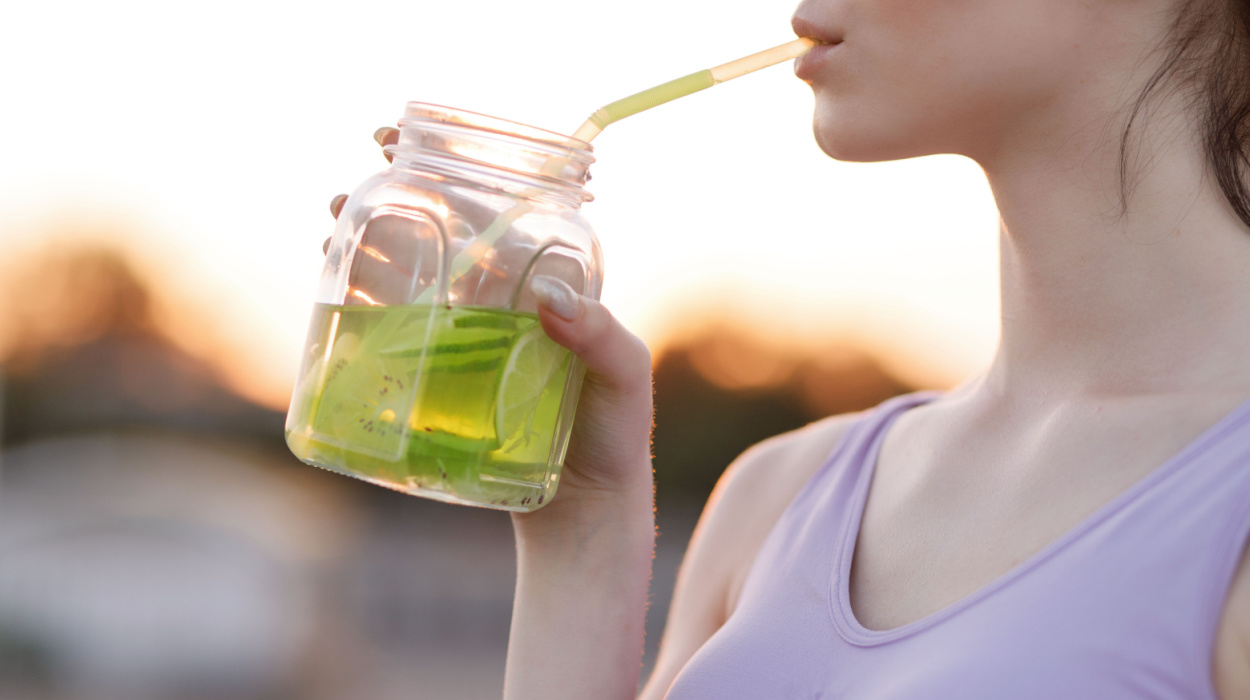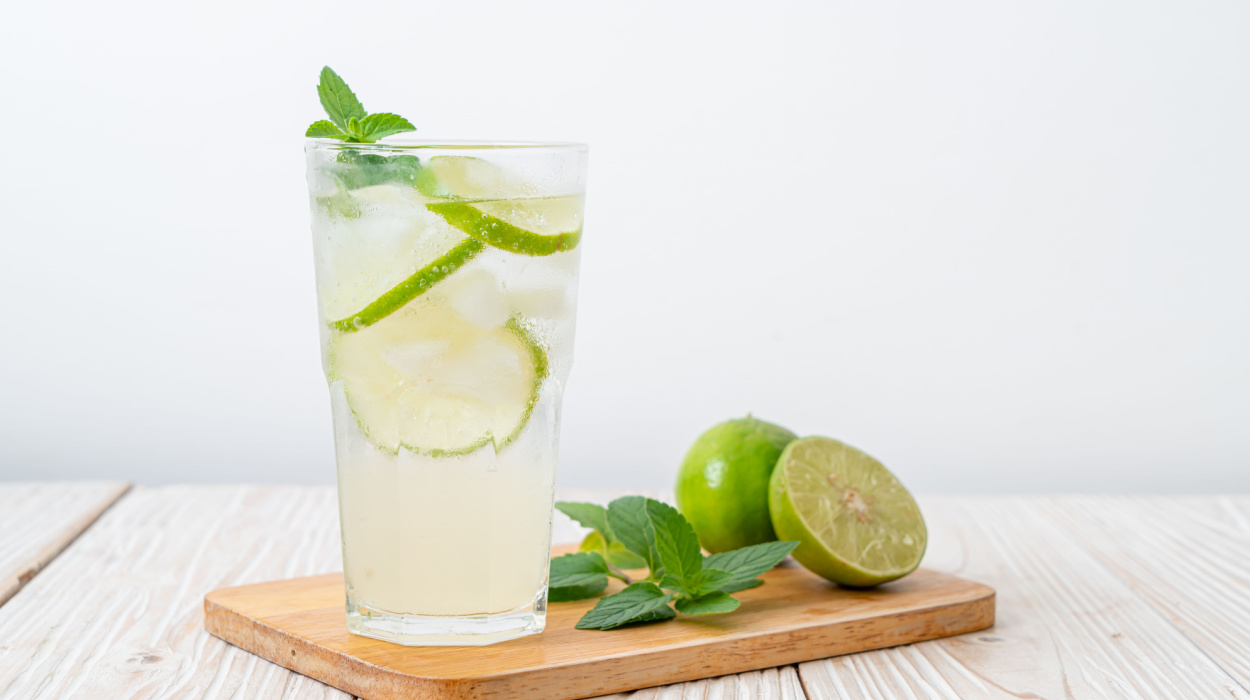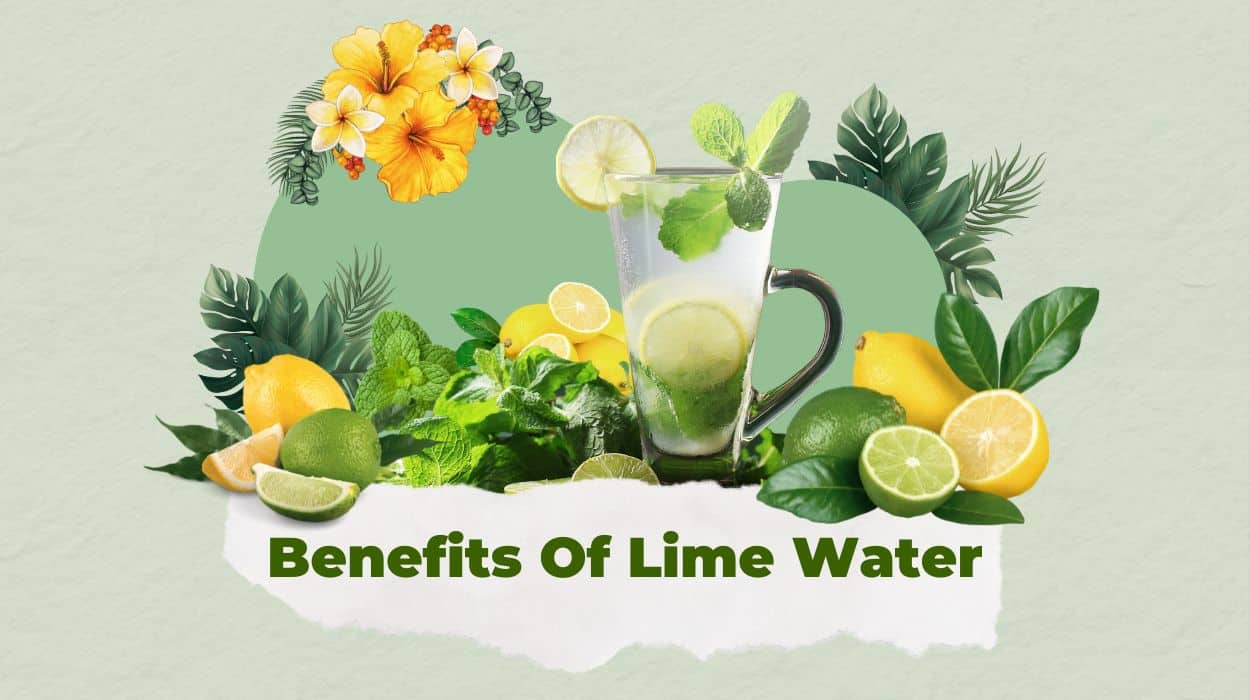Did you know that something as simple as adding lime juice to your water could unlock a myriad of health benefits? Limes, often listed among the best fruits for weight loss, can transform plain water into a tart, refreshing drink with nutritional value.
This blog post delves into the magic of citrus fruits, specifically focusing on the many health benefits for the human body. We’ll explore everything from how lime water can aid digestion, support skin hydration, regulate blood sugar, and even help prevent heart disease.
You may already be familiar with the popular lemon water benefits, but did you know lime water can be just as beneficial? Whether you’re wondering, “Is lemon water good for weight loss?” or want to understand the advantages of its lime counterpart, this post is for you. So let’s raise a glass to the humble lime and uncover its powerful secret to wellness.
Lime Water Benefits For Health
- Improves skin health
- Supports digestion
- Helps with weight loss
- Boosts Immunity
- Promotes heart health
- Helps prevent kidney stones
- Assists in iron absorption
- Regulates blood sugar
- Enhances hydration
Benefits Of Lime Water
Improves Skin Health
Lime juice is a natural boon for skin health.[1] Collagen is the part of your skin that maintains elasticity and prevents wrinkles. Limes are full of vitamin C, which plays an important role in collagen production.
Furthermore, the antioxidants in lime combat free radicals, reducing signs of aging and promoting glowing skin.

Supports Digestion
Lime water can aid in digestion and reduce bloating. The citric acids in lime team up with digestive juices, helping to break down food more effectively. This can lead to fewer blood sugar spikes and improved nutrient absorption.
Helps With Weight Loss
Lime water can also be a helpful ally when fighting obesity and diabetes.[2] The high vitamin C content can boost metabolism, aiding the body in burning more calories. In addition, lime water can help control appetite, reducing the temptation to reach for sugary snacks.
Boosts Immunity
Lime water’s vitamin C and antioxidants contribute to a stronger immune system. Vitamin C is known to increase the production of white blood cells, which is crucial in defending the body against harmful pathogens. Moreover, it can help the body fight cold and flu viruses.
Promotes Heart Health
Drinking lime water regularly can contribute to heart health.[3] It aids in lowering high blood pressure and cholesterol levels, reducing the risk of heart disease. The antioxidants in lime also help improve blood circulation and reduce inflammation.
Helps Prevent Kidney Stones
Lime water can help prevent kidney stones.[4] The vitamin C found in lime can bind with calcium, reducing the risk of minerals building up in your urine. Additionally, it prevents the growth of calcium crystals that turn into stones.
About 60% of patients with kidney stones suffer from low urinary citrate. You can correct this by consuming just 4 oz of lemon or lime juice daily.
Assists In Iron Absorption
The vitamin C in limes aids the body in absorbing iron, a crucial mineral for maintaining optimal health. Drinking lime juice promotes iron absorption,[5] reducing the risk of iron deficiency.
Regulates Blood Sugar
The soluble fiber and vitamin C in lime can help regulate blood sugar levels. By slowing down the digestion of carbohydrates, lime ensures that the body absorbs sugar more evenly,[6] leading to fewer blood sugar spikes.
Enhances Hydration
If you have trouble drinking enough water, it can lead to a whole host of medical problems. Hydration is essential for maintaining body temperature, delivering nutrients to cells, and keeping organs functioning properly. Try adding lime to your drinking water. The flavor makes it more palatable, and the micronutrients encourage hydration.
What Is In Lime Water?
- Vitamin C is an antioxidant essential for immune function and iron absorption.
- Potassium is an essential mineral necessary for heart and nerve function.
- Antioxidants help protect your cells from damage by counteracting harmful free radicals.
- Flavonoids are plant compounds with nutritional benefits, such as anti-inflammatory properties.
- Citric Acid aids digestion, helps dissolve kidney stones, and enhances nutrient absorption.
- Fiber contributes to digestive health and can help control weight.
- Calcium and magnesium are essential for various bodily functions, including bone health (calcium) and nerve and muscle function (magnesium).
- Essential Oils: Limes contain essential oils, such as limonene, which contribute to their aroma and may have potential health benefits, including antioxidant and anti-inflammatory effects.
Drinking Lime Water: When And How Much?
When To Drink Lime Water?
- Digestion support: If you drink lime water for digestion support, having it 30 minutes before meals can stimulate digestive juices.
- Weight loss: Starting the day with warm lime water can kickstart metabolism.
- Hydration: Sipping on cold lime water throughout the day can be beneficial if you’re using it to stay hydrated.
- During Exercise: Lime water can be a refreshing and hydrating beverage to consume during or after exercise. It helps replenish fluids, provides a natural source of electrolytes, and offers a boost of vitamin C.
- Detoxification Periods: If you’re following a detox or cleansing program, incorporating lime water throughout the day can support the detoxification process. Lime water’s alkalizing properties and antioxidant content may aid in eliminating toxins from the body.
How Much Lime Water Should I Drink A Day?

A common recommendation is to drink at least eight glasses of water per day, adding the juice of half a lime (about half an ounce or 15mL)[7] to each glass can be a good starting point. However, this can vary depending on individual dietary needs, environmental factors, and activity levels.
If you’re new to lime water, start slowly, monitor your body’s reactions, and adjust accordingly.
Precautions
While lime water offers many health benefits, overconsumption can lead to a few potential side effects. For example, large quantities of citric acids can cause heartburn in some people. It can also wear down tooth enamel over time, particularly if you’re sipping throughout the day.
While lime water is generally safe for consumption, there are a few precautions to keep in mind:
- Tooth Sensitivity: Lime juice is acidic and prolonged exposure to acidic substances can potentially erode tooth enamel over time. To minimize the risk, it is recommended to drink lime water in moderation and rinse your mouth with plain water after consumption. It’s also advisable to wait for some time before brushing your teeth after consuming acidic beverages.
- Acid Reflux or GERD: Individuals with gastroesophageal reflux disease (GERD) or chronic acid reflux may find that the acidity in lime water exacerbates their symptoms. Lime water can increase stomach acid production and cause discomfort. If you have a history of acid reflux, it’s best to consult with your healthcare provider before regularly consuming lime water.
- Allergies: Some individuals may be allergic to citrus fruits, including limes. If you have a known allergy to citrus fruits, avoiding lime water to prevent allergic reactions, such as itching, swelling, or difficulty breathing is important. Seek medical advice if you experience any adverse reactions.
- Medication Interactions: Lime juice contains compounds that can interact with certain medications. It may interfere with the absorption or effectiveness of certain drugs, such as certain antibiotics, antacids, and medications for heart conditions. If you are taking any medications, it’s advisable to consult with your healthcare provider or pharmacist to determine if there are any potential interactions with lime water.
- Sun Sensitivity: Lime juice contains compounds called psoralens that can make your skin more sensitive to sunlight. If you consume lime water and plan to spend prolonged periods in the sun, be cautious and take appropriate sun protection measures, such as wearing sunscreen and protective clothing.
As with any dietary changes, it’s always a good idea to listen to your body and monitor how you personally react to consuming lime water. If you experience any negative symptoms or have concerns, it’s best to consult with a healthcare professional for personalized advice.
Lime Water Recipes To Try
Making lime water is simple. Just squeeze a fresh lime wedge into a glass of water.
But for those who want to step up their citrus fruit intake, there are other refreshing recipes to try:
Lemon-Lime Water: Combine the benefits of lemon water and lime water in one drink. Mix the juice of half a lemon and half a lime into a glass of warm water for a vitamin C-packed start to your day.
Lime-Mint Infused Water: Add a few slices of lime and a handful of fresh mint leaves to a pitcher of cold water. Let it sit for a few hours or overnight in the fridge, allowing the flavors to infuse. This is a refreshing alternative to sugary drinks, especially on hot days.
Lime Green Smoothie: Blend a handful of spinach, one ripe banana, the juice of one lime, and a cup of water. This smoothie benefits from the fresh lime juice and gives you a healthy serving of leafy greens.
Lemon-Limeade: Mix the juice of half a lemon and half a lime with equal water. Add a drizzle of pure maple syrup to taste. Other sweetener options include agave nectar, monk fruit extract, stevia, and organic sugar. Honey is also an option, but note that it doesn’t dissolve well in cold water.
Hot Lime Ginger Tea: This drink offers the benefits of lime and the soothing properties of ginger and honey. Enjoy it warm for a comforting beverage, or chill it for a refreshing, lip-pursing pick-me-up.
- Grate a one-inch piece of fresh ginger into a pot of boiling water.
- Reduce heat and let it simmer for 10 minutes.
- Next, strain the ginger water into a mug, add the juice of half a lime, and sweeten with a teaspoon of honey.
Conclusion
Is lime water good for you? Yes, lime water is a simple yet powerful beverage with numerous health benefits. It is rich in vitamin C, antioxidants, and other nutrients that support various aspects of health, including skin health, digestion, weight management, immunity, heart health, kidney stone prevention, iron absorption, blood sugar regulation, and hydration.
However, it’s important to exercise some precautions when consuming lime water. The acidity of lime juice can potentially erode tooth enamel and may worsen symptoms for individuals with acid reflux or GERD. Those with allergies to citrus fruits should avoid lime water, and it’s crucial to consider potential interactions with medications. Additionally, lime juice can increase sun sensitivity, so appropriate sun protection measures should be taken.
Ultimately, incorporating lime water into your daily routine can be a refreshing and nutritious choice, but it’s advisable to listen to your body, consume it in moderation, and consult with a healthcare professional if you have any concerns or specific health conditions.
Frequently Asked Questions
Drinking lime water offers benefits such as improved skin health, digestion support, weight loss assistance, boosted immunity, heart health promotion, kidney stone prevention, assistance in iron absorption, blood sugar regulation, and enhanced hydration.
Lime water, rich in vitamin C and antioxidants, promotes collagen synthesis, reduces signs of aging, and protects against damage caused by free radicals, resulting in improved skin health.
Yes, lime water aids digestion by stimulating the production of digestive enzymes, promoting healthy digestion, reducing bloating, and improving nutrient absorption.
Lime water can be helpful for weight loss as it boosts metabolism, promotes feelings of fullness, and assists in the breakdown of fats, thereby supporting weight management.
Lime water’s high vitamin C content increases the production of white blood cells, strengthening the immune system and helping the body fight against pathogens like cold and flu viruses.
Lime water contributes to heart health by aiding in lowering high blood pressure and cholesterol levels, improving blood circulation, and reducing inflammation.
Lime water, when consumed regularly, can help prevent the formation of kidney stones by increasing urinary citrate levels and inhibiting the growth of calcium crystals.
It is recommended to drink at least eight glasses of water per day, adding the juice of half a lime (about half an ounce or 15mL) to each glass. Lime water can be consumed before meals for digestion support, in the morning for metabolism boost, throughout the day for hydration, during or after exercise, and during detoxification.
 Expert's opinion
Expert's opinion
